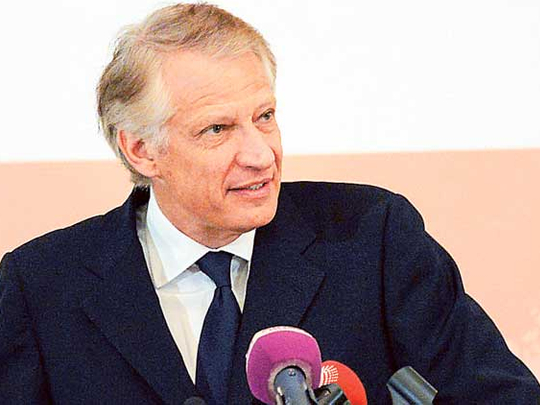
Manama: Former French prime minister Dominique de Villepin has warned of cross-border religious radicalism and the break up of nation states as he sketched three scenarios for the future of the Middle East.
“Today, the Middle East is at a crossroads. There are three scenarios for the future in the coming years,” he said. “The Islamist winter is the first scenario. We see more and more radical and jihadist groups crossing borders. They consider this is a fight for a new Middle East under a single rule. A Middle East with no place for religious minorities. A Middle East at war with the rest of the world. This scenario would be a catastrophe,” de Villepin told the Gulf Strategic Conference in Bahrain.
“The second scenario does not look much brighter. It would be the break-up of the nation states and the subsequent balkanisation of the Middle East, with the rivalry of ethnical, religious, and confessional minorities. This is by no means an improbable scenario. Just look at what happened in Iraq after the war of 2003: the Iraqi state is not much more than an empty shell with three quasi-autonomous territories, the Kurds, the Sunni and the Shiites. Look at Libya, divided in three semi-autonomous parts — Fezzan, Cyrenaïca and Tripolitana — and in fact split up in a mosaic of smaller tribe-led territories. Look at what is happening right now in Syria. Communities are entrenching territories and emptying them of their minorities through terror. Soon there will be whatever the outcome of the civil war a Kurdish Syria in the northeast, An Alawite Syria in the mountains near the shore of the Mediterranean and a Sunni Syria,” he said.
However, the third scenario painted by de Villepin looked less grim.
“There’s a third scenario that would be much preferable. It is the scenario of a negotiated transition towards modernisation of the Middle East. The economic, demographic, educational changes of the last decades have changed the way people of the Middle East look at the world and at their future. The stake is not to resist modernity — and the West — through a traditional Islam. On the contrary, it is to insert Islam in the global modernity, as the culture of dialogue, peace and openness it was in the past,” he said.
Dialogue
The former French cabinet head suggested that the Middle East, tired of 40 years of wars, choose stability and development.
“It is dialogue. There is an opportunity today for a peaceful settlement of the different crises through a political and diplomatic process, as has been shown by the recent debates about the destruction of chemical weapons under the control of the UN in Syria. We should seize this opportunity for a comprehensive regional appeasement,” he said at the two-day conference organised by Bahrain Centre for Strategic, International and Energy Studies to discuss regional and international transformation and security.
Economic and social reforms
“What is needed is stability. That is why regional cooperation organizations are particularly necessary to help each country find the best path because they can promote negotiation and mediation. Economic growth is also crucially needed and this means today developing infrastructure projects to open up the countries to each other.”
Economic and social reforms are needed to develop entrepreneurship and setting free the economic energies, he said.
“I think in this regard the sovereign funds of the Gulf have the ability to shape a part of a sustainable future for the whole region by supporting innovative projects, by fostering clusters of industries in precise zones around the region,” he said.
De Villepin also took a swipe at the US “illusion” that it could “obtain security through technology”.
“Facing the challenges of political stability, there are temptations, there are illusions that have to be resisted because they are creating even greater perils,” he said in his speech. “Today, some strategists think you just have to invest more money and to develop more innovations and that, this way, you will get rid of all threats. It is the belief that you can overcome resisting forces definitely. That is what is happening in America since the Obama Administration took over the wars of the Bush era. Their public opinion could not endure human losses in these long wars. Since 2008, drones have taken over the missions of soldiers. 3,000 drone strikes have led to 30,000 killed persons, not all of them direct targets. The same temptation exists to control borders, with the belief that this way you will control violent threats. That is how desert borders became hypertechnological fences, with very high costs, but in fact limited profit in terms of security. The truth is you can only contain threats, you can control them, you can learn to live with them, but you cannot make them disappear only through force.”












